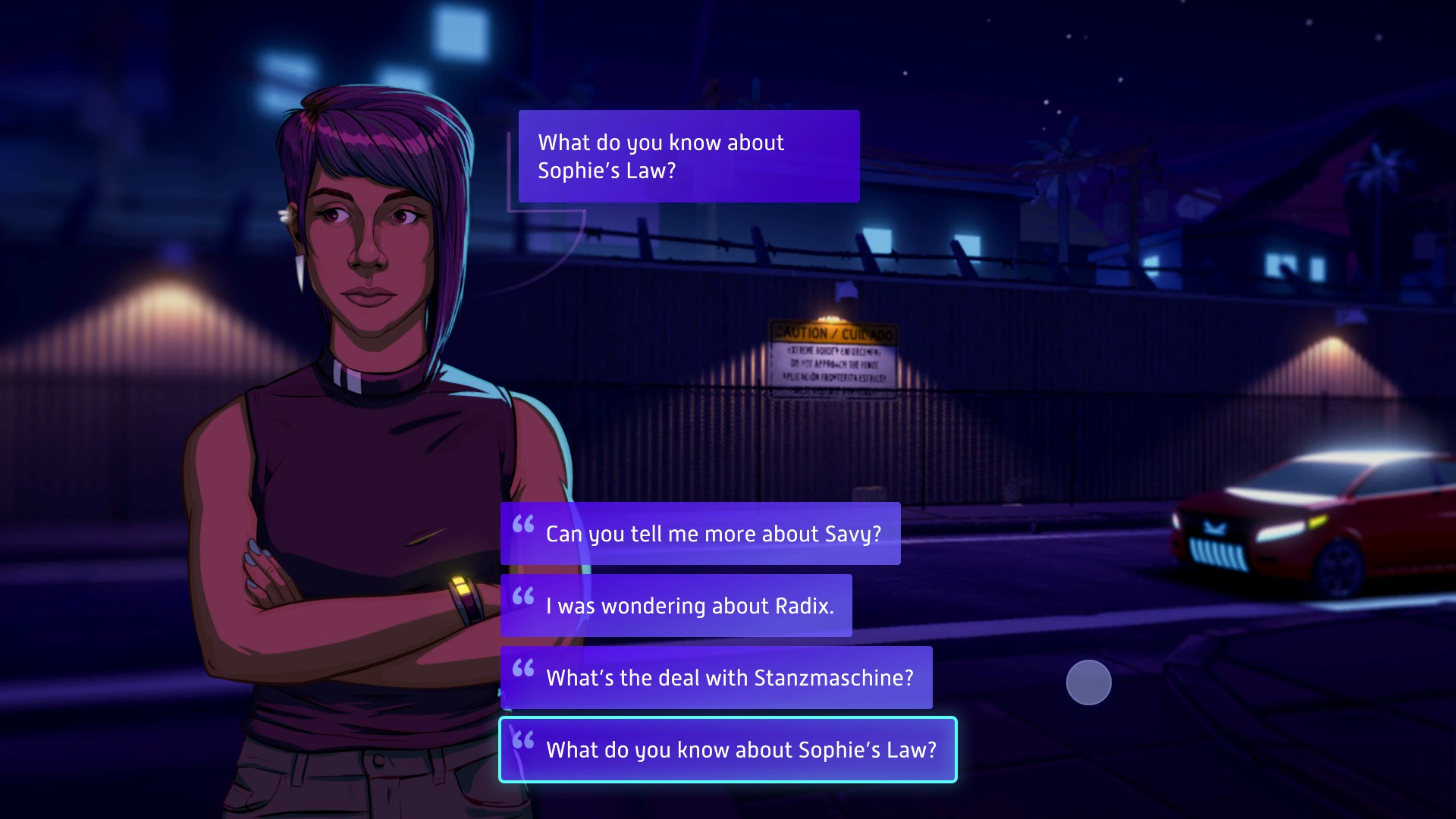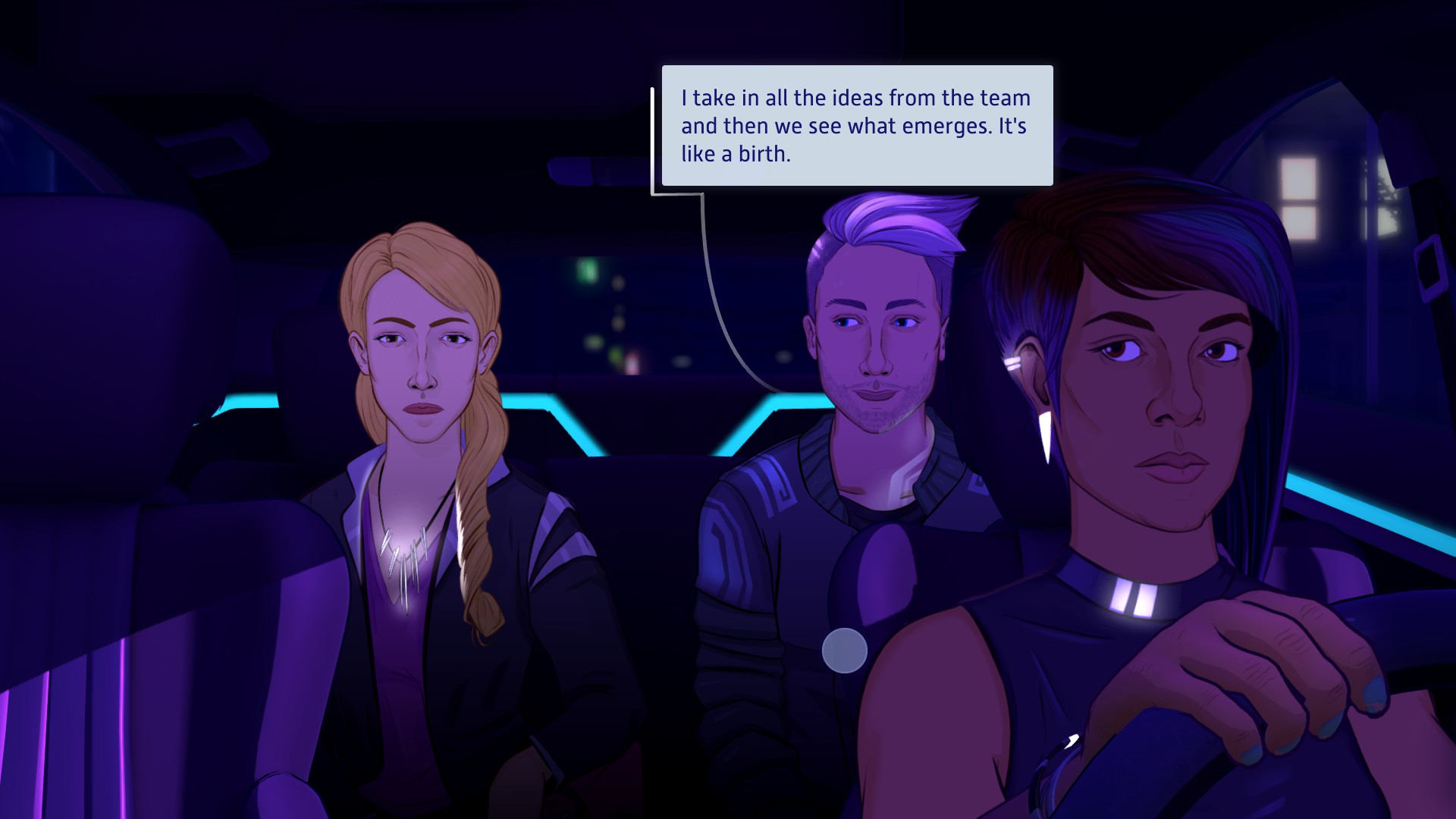Our Verdict
Neo Cab is ambitious and thoughtful, but it sometimes overshoots into something too bleak.
PC Gamer's got your back
What is it? A fantasy about having meaningful conversations in a taxi.
Expect to pay: $20/£16
Developer: Chance Agency
Publisher: Fellow Traveller
Reviewed on: Core i5-8400, GTX 1060, 16 GB RAM
Multiplayer? None
Link: Official site
Lina is ready to start a new life. When you meet Neo Cab’s protagonist, she’s en route to Los Ojos, a fictitious city reminiscent of Los Angeles. Her taxi holding the last of her belongings, she sets out to reconnect and move in with her best friend Savvy. When Savvy disappears, Lina is all alone in the eerie 'Automation City', suddenly left to juggle the demands of her job, her mental state and the mystery surrounding the person she thought she knew best.
After Night Call, Neo Cab is the second taxi driver-detective game this year, but despite this rather astounding coincidence, Chance Agency’s game takes a completely different point of view. Like any other taxi driver, Lina has to ferry a certain number of passengers, called pax, to their destinations each night, and keep enough money to herself to find a place to sleep. However, technology plays a huge part in each encounter, as everyone she meets is using or affected by some gadget. The future Neo Cab paints may seem slightly dystopian, but it skillfully depicts how we’re not as far from our very own version of automated cities as we may think.
Over the course of a week, you pick up different passengers each night, and have a chat with each of them during the ride. The quality of your talk doesn’t only determine whether you get a tip or not, it’s also absolutely crucial for your driver rating. You have to maintain a rating of four stars or higher or you risk a deactivation warning. Failing to raise your rating theoretically ends the game, though I tried doing as poorly as I could and still didn't hit a game over state. Chance Agency was inspired by the rating real Uber drivers have to maintain, and playing the game you notice very quickly how devastating it can be to get anything but a perfect rating, though my inability to truly fail undercut that feeling somewhat.

Keeping it real
The best thing about Lina is how she can’t always keep her opinions to herself. At the beginning of the story, Savvy gifts her with a so-called FeelGrid, a bracelet that assigns a colour to Lina’s mood. This is my personal highlight of Neo Cab. At first I was afraid this would be a very simplistic system allowing you to treat Lina similarly to how you would treat your sims—if Lina is sad, she should probably spend a night in a real bed and not at a capsule hotel, and so on. But most of the time there is no way for you to influence Lina’s mood directly. Instead, how she feels influences her behaviour. If a pax annoys Lina during their conversation, she may simply be unable to make a joke to diffuse the tension and save her rating.
Lina is completely new to most of the things she encounters in Los Ojos, or at least very sceptical of inventions such as holographic make-up or human-like AIs. In a way she represents present society, those of us who find deepfakes very creepy or who are surprised to find out how many businesses Amazon actually owns. In Capra, Neo Cab has a comparable megacorporation. Lina treats them like a villain, a shadowy nemesis using everyone’s data to build an empire in which people are influenced in ways they can’t even fathom. It sounded exaggerated at first, but felt increasingly plausible the longer I considered Neo Cab's world. That’s the whole point—inventions like putting children in mechs seem farfetched, but Neo Cab invites us to consider how close we already are to a technological dystopia, in the same way a season of Black Mirror would.

The overall mystery surrounding Savvy, however, isn’t even half as interesting as the questions the game poses through the parts of conversations not dedicated to solving the case. That’s because there is no one size fits all solution to a problem much larger than the plot of a game. It’s marvellous that Neo Cab made me think about our dependence on corporate monopolies, but the ending is almost inevitably disappointing for it.
Neo Cab is also rather gluttonous in how much it attempts to cover during its short runtime—its central plot concerns autonomous cars and an Uber-style gig economy, but then there’s AI, consumerism, tourism, race... all of these subjects are undeniably connected, but to go through such weighty topics one taxi cab confessional at a time feels insufficient.
The writing is atmospheric throughout, especially when Lina has the opportunity to simply sort through her own thoughts, but Neo Cab’s greatest trick is that I can’t tell whether everything that seems a little fake to me—the at times overly-philosophical conversations, me questioning every kindness—was purposefully designed to feel that way.
Neo Cab is ambitious and thoughtful, but it sometimes overshoots into something too bleak.


